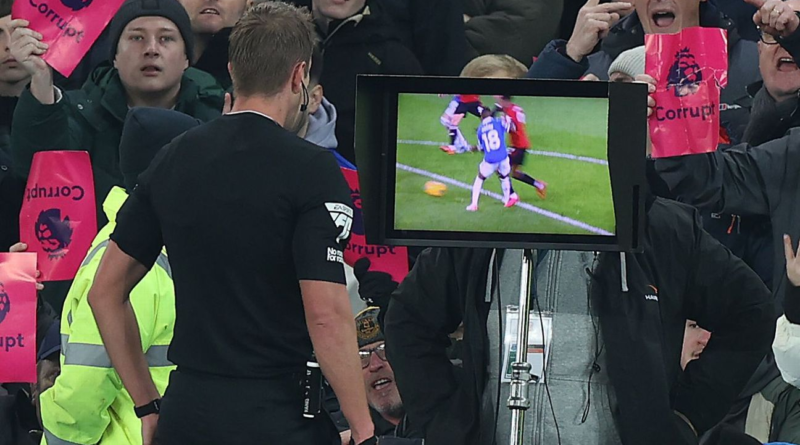Wolves lose vote to axe VAR in PL by 19-1
Wolverhampton Wanderers have failed to receive any support from other teams in the Premier League in their bid to get VAR scrapped, with clubs voting 19-1 on Thursday to keep the video assistant.
Wolves lodged a motion for consideration at the end-of-season AGM stating that “the price we are paying for a small increase in accuracy is at odds with the spirit of our game, and as a result we should remove it from the 2024/25 season onwards.”
Fourteen clubs of the 20 top-flight clubs were needed to back Wolves’ motion for it to pass and for VAR to be removed from English football with immediate effect. It was thought the vote might not even go ahead due to a lack of support, and although it did, it was essentially a token measure, having been effectively reduced to an umbrella discussion of areas for improvement
Ahead of the annual general meeting, clubs who regularly play in European competition, which features VAR, had not been expected to entertain removing it from the Premier League, and clubs from lower down in the table had indicated that ditching the video referee at this stage would be counter-productive.
While other clubs shared Wolves’ concern about ongoing problems with the implementation of VAR, many believe that it provides a safety net against poor on-field decisions and that steps should be taken to improve the processes.
Clubs agreed on six action points for the improvement of VAR:
1. Maintaining a high threshold for VAR intervention to deliver greater consistency and fewer interruptions to the flow of the game.
2. Reducing delays to the game, primarily through the introduction of semiautomated offside technology (SAOT) and the maintained high threshold for VAR intervention.
3. Improving fan experience through a reduction in the delays, in-stadium announcements from referees after a post-VAR change of decision, and, where possible, an enhanced offering of big-screen replays to include all VAR interventions.
4. Working with PGMOL (Professional Game Match Officials Limited) on the implementation of more robust VAR training to improve consistency, including an emphasis on speed of process while preserving accuracy.
5. Increasing transparency and communication around VAR — including expanded communications from Premier League Match Centre and through broadcast programming
6. The delivery of a fan and stakeholder VAR communication campaign that will seek to further clarify VAR’s role in the game to participants and supporters.
Shortly after the Premier League revealed Wolves’ motion had been defeated, the club released a statement.
“While we are disappointed with the outcome of the vote on the future of VAR at today’s Annual General Meeting, we acknowledge and accept the decision made by our fellow clubs and we are reassured that the Premier League is taking the concerns of clubs and supporters seriously,” the statement read.
“We welcome the commitment to improve VAR, particularly in areas that address delays, consistency, and fan experience. While we still believe that Premier League football would be superior for supporters, players, coaches and viewers without VAR, we think that these improvements are crucial for the integrity of the game and for enhancing the overall matchday experience for our supporters.
“Wolves remain committed to working closely with the Premier League and PGMOL to ensure that VAR continues to evolve and better serve the interests of football. We appreciate the efforts being made to address the issues that we have highlighted in our resolution and look forward to seeing whether the changes implemented this summer can reverse the decline in matchday experience for our fans, and respect for our officials.”
With 38 VAR errors in 2022-23, the Premier League highlighted a 21% drop in mistakes year-on-year to show things are getting better despite some high-profile incidents. Yet the problem is there are many more situations outside of those identified by the KMI Panel that managers and fans will feel are wrong.
Clubs approved referees announcing the explanation for a VAR overturn to the crowd. This will largely apply only to a referee visiting the pitchside monitor to overturn a subjective decision, which happened 66 times last season. It will not apply to the occasions when a VAR checks and opts not to send the referee to the screen, so for instance three penalty incidents that incensed Nottingham Forest in their 2-0 loss at Everton in April. This cannot include any use of the VAR audio.
It’s hoped that this will remove some of the inertia inside a stadium about why a decision has been changed, but it is unlikely to go far enough to placate fans who feel VAR has taken far more away from the game than it has added.
The AGM comes less than two months after the 20 Premier League clubs voted to introduce SAOT next season, which involves a contract with a new offside technology supplier, Second Spectrum. That will be delayed until after one of the autumn international breaks as further testing is required to ensure the system is robust.
It is hoped that SAOT will, on average, make offside decisions 31 seconds quicker by removing the human aspect of the VAR drawing lines onto the players. But this technology isn’t going to make offside calls instant; there is likely to be an increased number of marginal decisions as, unlike the current Hawk-Eye software, SAOT doesn’t have a built-in tolerance level, and in some situations — where several players are involved in close proximity — the VAR might have to resort to using the old Hawk-Eye system.
Second Spectrum has been the official tracking provider of the Premier League since 2020 and will use AI-powered skeletal tracking technology — which provides the foundation for SAOT. However, as in Serie A and the UEFA Champions League, there won’t be a chip within the ball to automatically detect the kick-point. So far this has been used only at the FIFA World Cup, but it will be used by UEFA for the first time at Euro 2024.
The Premier League is, to an extent, constrained by the International Football Association Board, the sport’s lawmaker, as to what can be shared during a game, such as the conversation between the referee and VAR as it happens. The Premier League said it would “continue to lobby IFAB to allow greater flexibility in the Laws of the Game to allow live video and audio broadcast during VAR reviews.”



